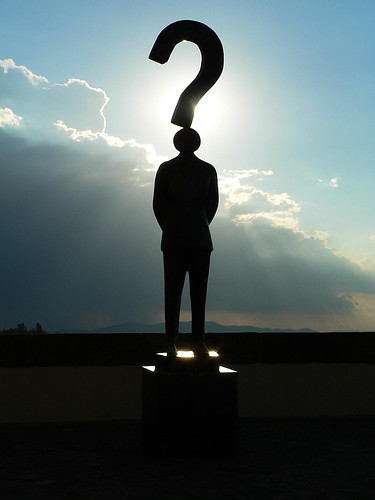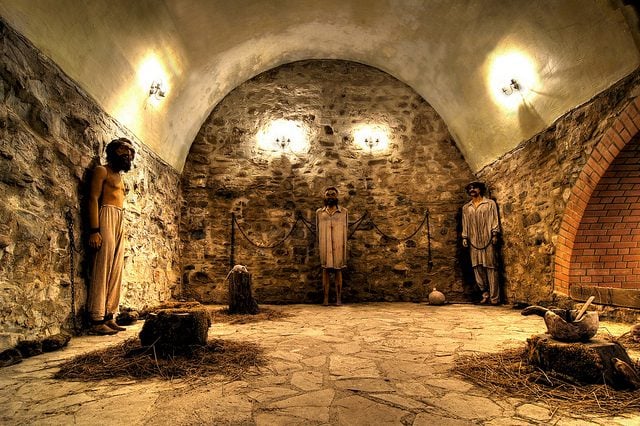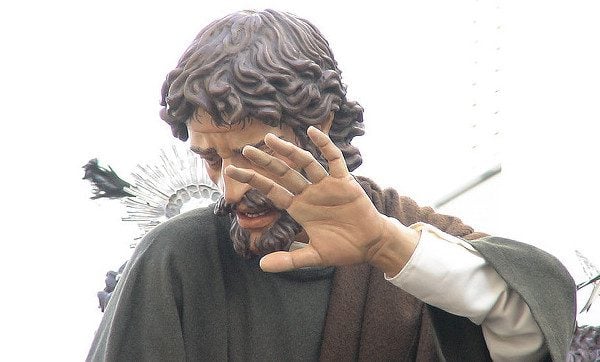On July 29, I was ordained to the transitional diaconate in Northern California with eight other wonderful people, including two others from my sending parish, Grace Fairfield. The following day, I got to preach this sermon in the same church where I was confirmed and where both my children were baptized. It was good to be back.
Proper C:
2 Kings 2:1-2, 6-14/ 1 Kings 19:15-16, 19-21; Psalm 77:1-2, 11-20, Galatians 5:1, 13-25; Luke 9: 51-62

One of the greatest things about being a parent is listening to my children process their world. Sometimes it feels like there is an endless stream of questions. For awhile, my oldest son was obsessed with the limits of the sky. “Daddy, is the sky squishy or is it hard?” he asked. “Why doesn’t the sky have a ceiling?” Other times, he wanted to know about things closer to the ground. “Do puppies get sad? What makes puppies sad? What does it sound like if a puppy cries? What is a poor puppy?” And when it wasn’t animals, it was plants. “What is a hibiscus named after?” he asked. Finally, he decided it must be named after a hibiscus.
I love these questions. Even on days when they come rapid-fire from the backseats. Even on days when the questions don’t make any sense. These questions are how he is clarifying and learning about the nature of the world around him, what it means to be a human walking around on dirt and concrete, and what it means that he is a beloved child of God.
Of course, we all have our own questions about our world and about our faith. Like my children’s questions, they are questions that help us to understand what it means for us to be humans walking around on this breathtaking and heartbreaking terrestrial sphere, this awe-filled and awful world.
We all have them, and often, we might be afraid of them, of where they might lead, or what they might mean for our futures. Of course, we might also be afraid that when we ask our questions, we might not get the answer we are looking for. And we might not even get an answer at all. Our questions might be met with a divine silence, and what, my friends, do we do with that?
But I think it is in the asking of our questions that our work of faith really begins. That’s when things get interesting.
Today, the Psalmist asks some dark, difficult and lonely questions of God. Unfortunately, the Lectionary excises them from our reading today, as if they are too hard or too difficult to hear from the writers of something as holy as Scripture. We begin in verses one and two, but then skip to verse 11.
In those left-out verses, the Psalmist expresses restless and troubling feelings of being abandoned by God, so much so that he cannot sleep. He asks, “Will the Lord cast me off forever? Will he no more show his favor? Has his lovingkindness come to an end for ever? Has his promised failed for evermore? Has God forgotten to be gracious?” He concludes this litany of doubt and questioning with this haunting summary, “My grief is this: the right hand of the most High has lost its power.”
These are heavy and holy questions. And, I’d bet, a few of you have asked these questions as well when we observe a world stricken with epidemic inequality, poverty, hunger, war, oppression and violence. Sometimes we can’t help but ask these questions. Sometimes we, too, might echo the Psalmist and mourn what seems like the absence of God, mourn that the right hand of God seems to have lost its power.
In many ways, the Psalmist reminds me of the question James and John asks Jesus in today’s gospel. They had just witnessed the Transfiguration and had seen the divine power and glory of Jesus in spectacular fashion. They had seen their Lord on the mountaintop conversing with Moses the Liberator and Elijah the Prophet. Now, traveling toward Jerusalem, Jesus had been rejected by a Samaritan town. Smarting from the rejection of their lord, James and John want to exercise a little of that divine power they had just witnessed.
“Do you want us to command fire to come down from heaven and consume them?” they ask.
It’s hard not to read a certain prejudiced eagerness in their question. It seems almost rhetorical, as if they assume Jesus will share their own desire for vengeance. There was certainly no love lost between Jews and Samaritans in that day. In fact, the ancient Jewish historian Josephus tells the story of another Galilean who was heading toward Jerusalem on pilgrimage.(1) Passing through a Samaritan town, however, the Galilean was murdered. When the pilgrims already in Jerusalem got word of the killing, they took another kind of pilgrimage. They marched on the Samaritan town and returned violence for violence, bloodshed for bloodshed, evil for evil. The riots and violence got so out-of-hand, that Roman soldiers were eventually dispatched to restore order through further violence and through the crucifixions of town leaders.
It is in this cultural atmosphere that the disciples ask a perfectly reasonable question of their Lord.
But Jesus rebukes them. This isn’t just so slap on the wrist, folks. It isn’t just a gentle correction or even a stern talking to as we might give a misguided child. Jesus rebukes the disciples in the same way he rebukes demons and unclean spirits. He rebukes them in the same way he rebukes Peter for protesting the coming suffering and crucifixion of Jesus when he famously says, “Get thee Behind Me, Satan.”
This is a serious rebuke. And it is meant for us today as well. Because the demon or retaliation, of violence-for-violence is still very much alive today, infecting our nation and our world like nothing else.
Calling down fire from heaven seemed the natural response for the disciples, who had just seen Jesus in all his power and glory with Elijah. If he is now wearing the mantle of the prophet Elijah, then shouldn’t he too have the power to call down fire and brimstone as Elijah had. After all, what good is divine power if it doesn’t take control, doesn’t get even, doesn’t settle scores? What good is all this transfigured power if all it does is lead to a cross?
Or as the Psalmist might say, “Has the right hand of God lost all its power?”
But in his rebuke, Jesus is reminding his disciples, and us, that there is no condemnation in Christ, even among those — especially among those — that refuse us, that condemn us, that reject us, that wish us harm. What’s interesting is that here these Samaritans had rejected Jesus, completely! The town went against all cultural norms and values about hospitality and welcoming travelers. They had refused to even let Jesus set foot in their town!
And yet, when given the option to retaliate, Jesus recognizes the suggestion from his disciples for what it is. He sees through the seductive veil of vengeance. He sees it for the temptation it is, that same temptation he faced in the desert to bow to the power and wisdom of the world and take the kingdoms of humankind by force, the same temptation he is wooed by when he instructs his disciples to pack the swords on the road to Jerusalem, the same temptation he will face when Peter draws that same sword in the Garden of Gethsemane and strikes out in violence and vengeance.
Jesus sees the devil in it all, in the violence, in the retribution, in the judgement, in the idea that the Samaritans are any less than beloved children of God, his brothers and sisters, even if they reject him in the most offensive ways imaginable at the time.
And Jesus goes one step further than rebuking it.
And this is what makes the story so transformation.
Jesus goes on to make the despised and hated Samaritans,the ones who rejected him, the ones who the disciples want to call down fire and destruction from heaven — Jesus goes on to make them heroes and transforms them into one of the most enduring examples of what it means to follow him.
Just a few verses later, Jesus tells the story of what we now call the Good Samaritan.
The enemies are now the heroes.
Think about that for a moment. Think about your own enemies, our nation’s and our communities’ enemies. Think about the people we collectively and passionately despise. Think about the people we wish to call down hellfire on. Think about the people on whom we already do. It’s the Fourth of July. Surely we can think of a few folks who reject our way, just as the Samaritans that day rejected the way in which Jesus was traveling.
Now, imagine a story in which they are the heroes. A story in which they have something valuable to teach us. A story in which they will reveal to us our own self-righteousness and shortcomings.
Can we imagine a story in which they teach us the Way of Jesus?
Because that is what Jesus asks of us when we follow him.
He asks us to see our enemies as human, as the ones who hold for us the way of salvation, just like the Samaritans were for the disciples.
It is a costly path. And Jesus acknowledges as much. It is a path, that if we follow it, will lead to suffering. It will cause us to leave our families, or at least, cause our families to feel abandoned. It will change us, and change us to the point that the people closest to us might not recognize us anymore.
It might be painful. It might lead to a cross. But, once we begin to glimpse the humanity of our enemies, once we begin to see our enemies as our kindred in Christ, once we begin to see our reflections in the faces of those we despise, we can never look back.(2) Once we put our hand to the plow and begin to sow the seeds of God’s reign, we will never see the world again in the same way.
One morning not too long ago, my children decided to role play as only a minister’s children can.
At the breakfast table, my youngest looked at his brother and said, “Let’s play God. I’ll be God and you be Jesus, okay?” Brendan agreed, and I mumbled something about how I didn’t think this would end too well.
“The Romans are going to kill you,” he said to his brother. “They have lots of swords.”
“And God doesn’t use swords,” I interrupted quickly, hoping to head-off the development of any damaging theology or just another brotherly argument. “God uses love.”
But then my oldest son paused, and I could tell he was thinking hard about something. Finally he asked his question. It wasn’t about the limits or consistency of the sky or the emotions of a puppy as they usually are. Rather it was a powerful question about the character of God, much like the Psalmist’s and the disciples’ questions this morning. Much like my own questions.
“Did anyone ever tell God to fight with love?”
“All the time,” I replied. And in one simple question, he had accessed the paradoxical beauty of the Incarnation, that God would enter into our reality not with the right-handed power of the Most High, not with desire to call down fire-and-brimstone of those who might reject him, not with the intention to fix everything like a cosmic handyman. Rather, God enters our reality in order to come alongside us, to journey with us only with the power to love, to forgive, and to reconcile the world.
—
Sources:
1. Crossan, John Dominic. Power of Parables:How Fiction by Jesus Became Fiction About Jesus
2. Douglass, James. JFK and the Unspeakable: Why Died and Why It Matters











